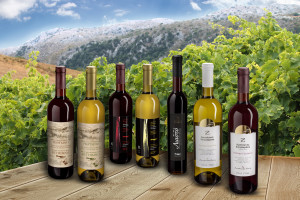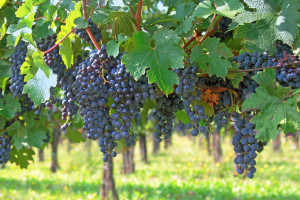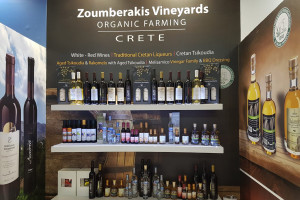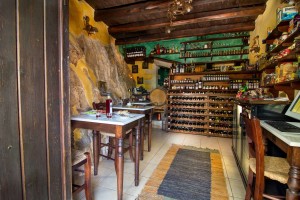Organic wine
What is Organic Wine?

Organic wine is a trend that has emerged worldwide and in Greece in the past few years. More than a trend, it’s a requirement for lovers of quality in flavor. How many of us really know what ‘‘Organic Wine’’ is?
Until the 1950s, all viticulture was organic, since the use of artificial fertilizers and herbicides was limited and winegrowers only used organic products on crops. “Progress” brought with it chemical preparations, which promised fast, easy and large harvests; as a result, they dominated all crops for the next two decades. Thankfully, their adverse effects were spotted early: the return to organic crops was the only solution that respects both man and the planet.
Organic viticulture is becoming increasingly popular, accounting for more than 10% of the total production of organic products in Greece. A wine is organic when it is made using organic grapes. An analysis of its features shows that it has a much lower concentration in sulfites than conventional wines. Specifically, the concentration of sulfites does not exceed 100 mg/L for red wines and 150 mg/L for red - rose wines. Sulfite compounds in organic wine are lower by at least 50 mg per liter compared to conventional wine, always depending on residual sugar content.
Organic cultivation excludes the use of all types of chemical or artificial fertilizers, improvers or pesticides to help the plant grow or to fight diseases. By growing crops organically, winegrowers respect the ecosystem that is home to their vines and don’t harm the air, the soil or the groundwater with the use of toxic substances.
How is organic wine produced?

According to international specifications, organic cultivation is an integrated system for the production and management of agricultural produce that respects and does not harm the ecosystem throughout production and, most importantly, protects consumers’ health! This is achieved thanks to the absence of chemical fertilizers, herbicides, pesticides and hormones at all stages of cultivation.
More specifically and in accordance with international legislation, organic viticulture exclusively uses animal manure as a fertilizer; vineyards are protected from weeds and pests by organic means, while only copper and sulfur may be used to fight the vines’ two most common diseases, downy mildew and powdery mildew. In addition, only natural substances may be added to organic wines to shape the end product.
The vineyards and the grapes grow in their natural environment, without being adulterated by various chemical preparations and are, therefore, allowed to develop their own antibodies. Vines only need a few trace elements as nourishment: they mostly need hydrogen, oxygen and nitrogen, which form 95% of their nourishment and which they take from the air. The plant is self-sustaining and doesn’t need any fertilizer other than prunings and grape marc. Organic vineyards do not use pesticides, toxic herbicides and artificial fertilizers: the weeds around the vines are removed mechanically, while fertilizing is done with the use of compost and manure.
It’s easy to spot organic vineyards, with just one look: the “secret” lies in their unkempt appearance, with grass and other plants growing among the rows of vines. It hardly needs saying that each bunch of grapes “hides” behind it the dedication and meraki (the very heart and soul) of the winegrower, who is always present, in all weathers, monitoring how the vines grow and taking pride in the fruits of his toil.
What makes organic wine stand out?

Even before they reach the palate, organic wines stand out by their aromas, their purity and, of course, their special taste, which is pure and perfectly married to the aftertaste nuances of the grape from which the wine is produced.Organic grapes are of extremely high quality and free of chemical poisons. This means that, in the hands of an experienced winemaker, they can transform into wines that taste infinitely better than conventional ones.
Organic winemaking differs vastly from its conventional counterpart, as it is regulated by strict rules that render it unique. For example, winemaking practices such as partial concentration by cooling, partial dealcoholization, elimination of sulfur dioxide by physical process, electrodialyses and the use of cation exchangers are not allowed in organic winemaking, as they substantially alter the composition of the products as to their true nature.
As a matter of fact, the extremely low sulfite content of organic wine is a factor that is particularly appreciated when it comes to the protection of human health. In case you didn’t know, sulfites are responsible for the occasional ill effects of heavy consumption of wine, e.g. dizziness, nausea and a “heavy head”.
Zouberakis family’s winery
These are the principles that, for 3 generations, have underpinned the Zoumberakis Family’s activities; they know that the best investment in land is the respect for and dedication to natural ways of cultivation. The best way to see a 100% organic vineyard in action and to witness a small miracle wrought by Mother Nature, even before a drop of the wine passes your lips, is a visit to the Zoumberakis Family vineyards!So, if you love good wine and you tend to indulge a little, you’re better off with organic labels that, literally, bring nature to your glass.
The exceptional wines of the Zoumberakis Winery are the best way to be transported, sip after sip, to the intoxicating flavors and aromas of the Cretan soil. These wines are the perfect partners for your most special memories!
All the products of Zouberakis winery are to be found at our traditional like mini market - cafe at Samonas Traditional Villas, where you can taste and buy them.
Source: www.zouberakis.gr










